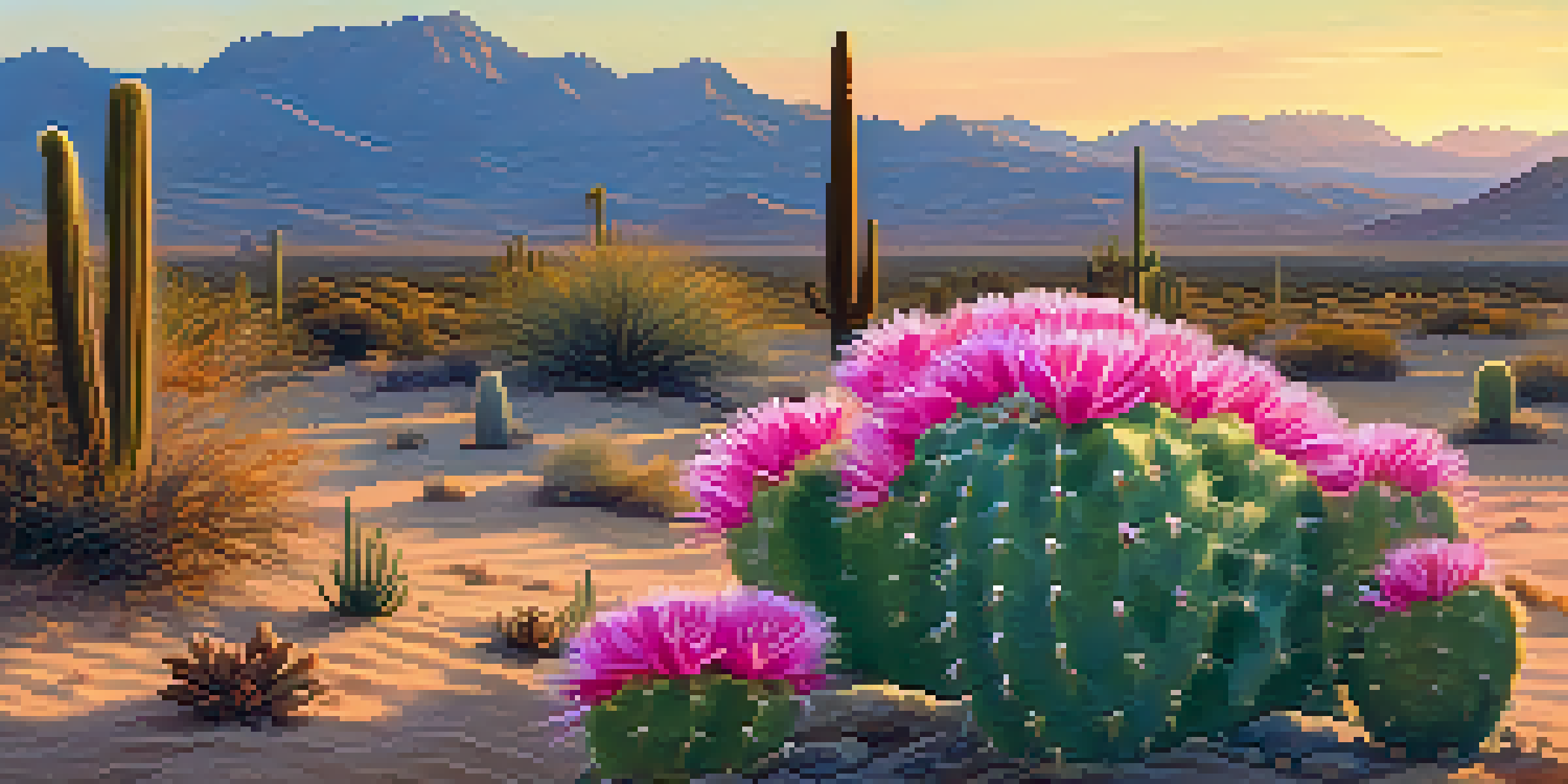Peyote: Bridging the Gap Between Nature and Spirituality

Understanding Peyote: A Unique Cactus with Spiritual Roots
Peyote, a small cactus native to Mexico and the southwestern United States, is well-known for its psychoactive properties. Traditionally used in Native American spiritual ceremonies, peyote contains mescaline, a compound that can induce profound altered states of consciousness. This unique cactus has become a symbol of spiritual exploration for many cultures, connecting them to their heritage and nature.
Psychedelics can help us understand the mind, and ultimately ourselves, in a profound way.
The use of peyote dates back thousands of years, with evidence of its consumption found in archaeological sites. Indigenous tribes have utilized its effects for healing, divination, and communal bonding. As a natural entity, peyote invites individuals to experience the world differently, often leading to transformative insights about life and spirituality.
In modern contexts, people are increasingly turning to peyote for its potential therapeutic benefits. Some studies suggest that mescaline can help with anxiety, depression, and trauma, providing a pathway for healing that resonates with both nature and the human spirit. Through these experiences, many find themselves on a journey that deepens their connection to the universe.
Peyote in Indigenous Spiritual Practices
For many Native American communities, peyote is not just a plant; it's a sacred ally in their spiritual practices. The Native American Church, which blends Christian beliefs with traditional indigenous practices, incorporates peyote into rituals that emphasize healing and communion with the divine. This practice fosters a sense of community and shared experience, reinforcing cultural identity and spiritual connection.

During ceremonies, participants often consume peyote to enter altered states of consciousness where they can seek guidance, healing, and insight. These experiences are deeply personal yet collectively shared, creating a bond among participants. The rituals surrounding peyote use are steeped in tradition, emphasizing respect for the plant and the spiritual journey it facilitates.
Peyote's Spiritual Significance
Peyote is a sacred cactus used in Native American spiritual practices, symbolizing deep cultural connections and communal healing.
Moreover, the emphasis on nature in these practices highlights the importance of environmental stewardship. By honoring peyote and its natural habitat, indigenous peoples remind us of our responsibility to protect the earth. This relationship between spirituality and nature serves as a powerful reminder of the interconnectedness of all life.
The Science Behind Peyote and Mescaline
Mescaline, the active compound in peyote, interacts with the brain's serotonin receptors, leading to enhanced perception and altered states of consciousness. This scientific understanding sheds light on why many users report profound experiences that can include deep introspection and a sense of unity with nature. By studying peyote, researchers hope to unlock the secrets of consciousness and healing.
The sacred is not just a part of life; it is life itself.
Studies have shown that mescaline can lead to long-lasting positive changes in mood and behavior, suggesting it may have therapeutic potential. These findings align with anecdotal reports from individuals who have used peyote for personal growth and healing. As more people seek natural alternatives for mental health support, peyote's role in this conversation becomes increasingly relevant.
However, it's crucial to approach peyote use with respect and understanding, particularly regarding its cultural significance. As interest in psychedelics grows, the importance of ethical sourcing and cultural sensitivity cannot be overstated. Balancing scientific inquiry with respect for indigenous practices is essential in promoting responsible use.
Peyote and the Quest for Personal Enlightenment
For many individuals, peyote serves as a catalyst for personal exploration and enlightenment. Users often report experiencing moments of clarity, profound emotional release, and insights that can shift their perspectives on life. This quest for understanding can lead to a deeper connection with oneself and the surrounding world.
The journey with peyote is often described as a vivid tapestry of experiences, where individuals confront their fears, hopes, and dreams. These revelations can be transformative, leading to lifestyle changes and a renewed sense of purpose. This personal growth mirrors the spiritual journeys undertaken by indigenous tribes throughout history.
Therapeutic Potential of Mescaline
Research suggests that mescaline, the active compound in peyote, may offer therapeutic benefits for mental health, including anxiety and depression.
As individuals navigate their paths, they often find that the lessons learned from peyote extend beyond the experience itself. The insights gained can inspire a commitment to mindfulness, compassion, and a greater appreciation for nature. This bridge between personal enlightenment and spirituality emphasizes the profound impact that peyote can have on individual lives.
Challenges and Controversies Surrounding Peyote Use
Despite its rich history and potential benefits, the use of peyote is not without challenges and controversies. Legal restrictions in many areas create barriers for both indigenous peoples and those seeking personal experiences with the cactus. These laws often overlook the cultural significance of peyote, fueling tensions between traditional practices and modern legal frameworks.
Moreover, the increasing popularity of psychedelics has led to concerns about the sustainability of peyote populations. Overharvesting and habitat loss threaten the very existence of this sacred plant. Advocates emphasize the need for responsible usage and conservation efforts to protect peyote for future generations while honoring its cultural heritage.
As discussions around peyote continue, it's essential to engage in respectful dialogue that considers the perspectives of indigenous communities. Balancing access to peyote with ethical considerations will be crucial in ensuring that its spiritual and cultural significance is preserved. This conversation underscores the importance of respecting both nature and the traditions that celebrate it.
Peyote and Modern Spirituality: A Growing Interest
In recent years, there has been a resurgence of interest in peyote among those seeking alternative spiritual practices. As more people explore spirituality outside traditional religions, peyote offers a unique avenue for connection and self-discovery. This growing curiosity reflects a broader societal trend toward holistic approaches to well-being.
Many individuals report that their experiences with peyote have led to a greater sense of purpose and connection to nature. This aligns with a desire to find meaning in an increasingly complex and fast-paced world. By bridging the gap between nature and spirituality, peyote invites individuals to slow down and reflect on their place in the universe.
Challenges Facing Peyote Use
The growing interest in peyote raises concerns about legal restrictions, sustainability, and the need for ethical engagement with indigenous practices.
As interest in peyote grows, it raises important questions about respect, access, and sustainability. Engaging with these considerations can lead to a richer understanding of both the plant and its cultural significance. Embracing the wisdom of indigenous traditions while exploring personal spirituality creates a pathway for meaningful connections.
Finding Balance: Respecting Nature and Spirituality
Ultimately, the journey with peyote is about finding balance between nature and spirituality. Respecting the cultural significance of peyote is essential, ensuring that its use honors the traditions that have upheld it for generations. This respect fosters a deeper understanding of the interconnectedness of all life and reinforces our responsibility to protect the environment.
As individuals seek their paths to enlightenment through peyote, it's vital to approach the experience with mindfulness and intention. This journey is not just about personal gain; it's an opportunity to connect with nature in a profound way. By cultivating this relationship, people can gain insights that extend beyond themselves, promoting a collective sense of responsibility.

In navigating this complex landscape, individuals can learn to appreciate the beauty of both nature and spirituality. By bridging the gap between the two, peyote serves as a reminder of the wisdom found in the natural world and the importance of nurturing our connections to it. This holistic approach enriches our lives and promotes a deeper understanding of our place within the greater tapestry of existence.